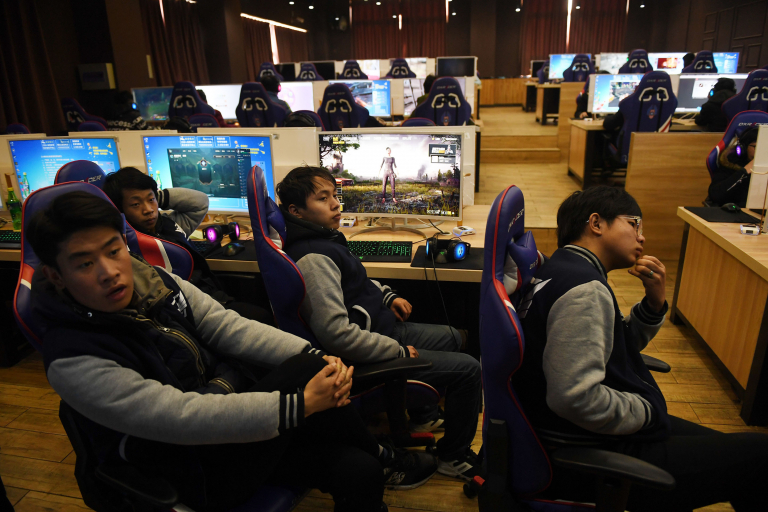In China’s eSport schools, students learn it pays to play

Students listen to teacher Yang Xiao explain game techniques in an eSports class at the Lanxiang technical school in Jinan, in China’s eastern Shandong province, on Jan. 29, 2018. Image: AFP/Greg Baker
Most teachers would not be impressed to discover a student playing video games in their class. But at a school in eastern China, it is mandatory, part of a drive to train eSport champions and tap into the booming industry.
“Dammit, I’m dead!” exclaims one student at the Lanxiang Technical School in eastern Jinan province as dozens of his classmates who are still in the game continue to furiously bash their keyboards.
Once associated with teenagers stuck in their bedrooms, eSports — where players square off in lucrative video game tournaments — are growing fast.
Chinese internet research company iResearch estimates 260 million people are already playing eSport games or watching competitions in the country, with the biggest bouts playing out to thousands of spectators in stadiums and many more online.
The growth shows no signs of slowing. Market research firm Newzoo estimates that the eSport industry will be worth $906 million (almost P47 billion) in global revenues in 2018, a 38.2 percent increase from last year. China alone will account for 18 percent.
Gaming has become a team sport at 910 universities across the Asian country, but there is also an increase in educational establishments, such as Lanxiang Technical, actively teaching the skills needed for eSports success.
Around 50 students signed up for its inaugural eSports course, which launched in September.
“At first, many parents thought it was just about playing video games,” school director Rong Lanxiang, told AFP. “In fact, it’s not the case, eSport is developing to a very high degree and it’s become an economic growth driver.”
League of Legends
At the school in Jinan, students focus on improving their skills in some of the most popular eSport games.
League of Legends, one of the world’s most played games, is a strategy driven bout where players fight each other in a digital arena.
First person shooters like Overwatch, Counter Strike and the hugely popular newcomer PlayerUnknown’s Battlegrounds, are also key parts of this unusual syllabus.
“This was a hobby for me, I was really into playing video games, and it’s a new industry, I think there are good prospects in it,” says Teng Xin, who says he racks up at least 20 hours game time a week.
At 22, the student fears he may be too old to be a professional eSportsman, but feels he could be a coach.
His eSports course lasts a full three years. During the first year, the classes are 50 percent gaming and 50 percent theory lessons on succeeding within the industry.
After the first year, the students are divided up. The best gamers focus on becoming professional players while the others are taught accompanying skills including event organization, promotion or coaching.
Song Jinze, a shy 16-year-old, says he wants to become a presenter.
Big tournaments attract huge online audiences and, just like any boxing or football match, a good presenter is a key part of the experience.
It’s not a career path his parents were happy with but he was able to persuade them of his prospects.
He says: “When I showed how much I love this and that I would persist with it, my dad agreed to let me come here to learn.”
The annual school tuition fees are around 13,000 yuan ($2,050 or P106,000), a fairly reasonable price for tuition in China. The most talented players who become part of the school team are exempt from paying.
Lanxiang Technical has its sights set on tutoring up to 1,000 eSport students.
Olympic status?
It is all a far cry from the situation less than a decade ago when the government was so concerned about youths spending excessive time on the internet it listed web addiction as a clinical disorder and drafted legislation to limit online time.
Today, China is a key eSport market. In November, more than 40,000 fans flocked to Beijing’s Bird’s Nest Olympic stadium to watch the final of the world championships for League of Legends.
ESports are to be included as a medal sport for the first time at the 2022 Asian Games in Hangzhou and proponents are pushing for Olympic status.
The eSports industry already employs some 50,000 people in China, according to local data firm CNG, but they estimate the demand is there to employ a further 260,000 across the country.
Alongside Lanxiang Technical, at least two other universities have opened up eSport courses. Overseas, Britain’s Staffordshire University plans to launch a three year course next September. Universities in Finland and Moscow already offer such courses, while there is an eSport Academy in Nantes, France.
“In the future, eSports will be present in every family and it’ll be more popular than basketball and football,” predicts Teng Xin.
He adds, “To practice traditional sports, you have to go outside and have space. But you just need a computer to practice eSports at home.” JB
RELATED STORIES:
This week in video game history: ‘Star Fox’ turns 25
Super Mario encyclopedia translated in English coming this October